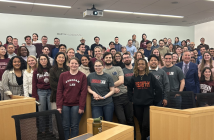Former three-term New York governor Mario Cuomo made an impassioned case for Congress taking back the power to declare war in an appearance at the Time Warner Center on Thursday, Nov. 20.
At “A Conversation with Mario Cuomo,” a 90-minute discussion moderated by Thane Rosenbaum, the director of the Forum on Law, Culture and Society,” Cuomo addressed a range of topics from his past, from his celebrated keynote address to the 1984 Democratic National convention to the U.S. Supreme Court nomination that he turned down from then President Bill Clinton.

Mario Cuomo Photo by Nancy Adler
But it was current events like the wars in Iraq and Afghanistan, the impending trial of alleged September 11 mastermind Khalid Sheikh Mohammed and the conundrum of a potentially nuclear Iran that riveted the packed auditorium.
“It’s common to say ‘The war in Afghanistan.’ There is no war in Afghanistan. There is no war. War has never been declared. This country doesn’t even know how you declare a war,” he said. “If you go to this country and say ‘Is it the president who declares war?’ I would guess 70 or 80 percent would say yes, but it’s not.”
Cuomo went on to chastise those who say that since war has not been formerly declared by Congress since World War II, that section of the Constitution is no longer relevant.
“Are you suggesting that you can amend the constitution by constant violation of it? That if you violate it enough, then it no longer counts?” he said.
“We are now with a president who’s talking about war as though it’s been declared, and it wasn’t, saying ‘Well, now I have to make a decision. Do I go there or don’t I?’ It allows for some wonderful political possibility,” he continued.
If he had President Obama’s ear, Cuomo said, he would make a decision about troop levels, but ultimately give the formal decision to Congress and make them speak on the issue. That, he noted was how the country’s first commander in chief would have preferred it.
“What George Washington said was “Look, I’m a commander in chief. The president should be a commander in chief, after you declare a war. Then the president will be in charge and will work with the military. But he shouldn’t be the one who does it because he’s only one person, and he doesn’t speak as much for the whole nation as much as the congress speaks for the whole nation,” he said.
“That’s a lack of law, that’s an ignoring of law, that’s an abuse of law, and it’s given us Vietnam, it’s given us Iraq, it’s given us Afghanistan, and now it’s giving us Pakistan.”

Mario Cuomo and Thane Rosenbaum Photo by Nancy Adler
As for his refusal to accept a nomination for Supreme Court, Cuomo harkened back to his childhood noting that right after his parents immigrated to the United States from Italy, his older brother Mario died from the flu when he was two. He said he never forgot how the lack of government failed his family then, and it helped inspire him to combat problems like AIDS, homelessness and the crack epidemic that raged during his years in office.
“You do it and you work on it for 12 years, and it’s all about people and it’s all about education and it’s all about the fundamentals, and you learn a lot of things along the way. You make a lot of mistakes and you learn about that, and you’re charged up, especially because of where I came from,” he said. “When you think about it, 80 years ago or so, they lost a Mario because there was no government. Now 80 years later, we have government, we have the ability to avoid those things.”
He said that when he was trying to explain to the president his rationale for declining the post, he fell back on a favorite parable:
An Arab in the desert looks down and he sees a sparrow lying on the ground with its claws distended, and he says ‘What are you doing down there?’ The sparrow says “They say the skies may fall, and I want to help hold them up.’ And the Arab says ‘Why, you stupid little sparrow.’ And the sparrow says “One does what one can.”
“I think that’s a wonderful story, because that’s all any of us can do,” he said. “Really, it would have been very easy to be a Supreme Court justice. Think about it: You never have to do a cocktail party, you never have to raise money, you never have to worry about your work product. You listen to these very intelligent people, you read these very intelligent arguments, you do your best, you write an opinion, you waft it out there to be read by anyone who wants to read, and if they don’t like it, so what? It would be a very simple job, but it’s not for me.”


